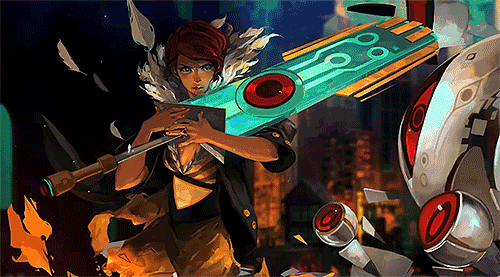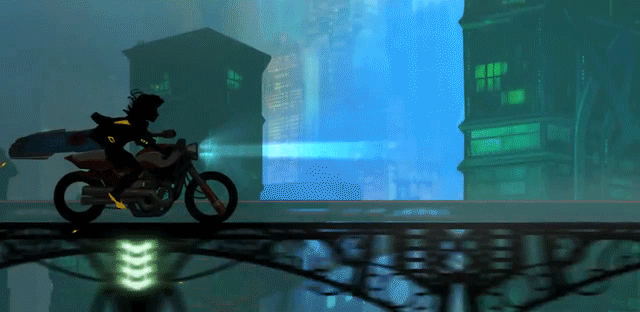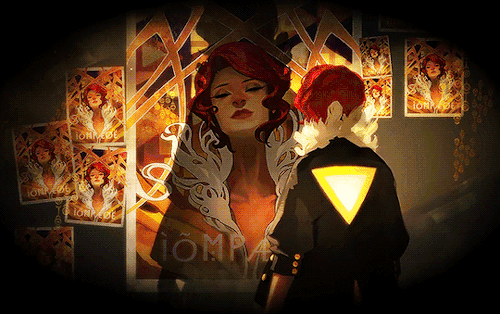Sometimes, you miss the party on something in pop culture, whether it be a game, book, show, or movie. Years later, you finally get around to experiencing that whatever-it-was, and then you start a new series on your website where you write story-focused reviews for those things.
Or at least, that’s what I’m doing!

Today, we’ll be reviewing Transistor, the 2014 indie release from Supergiant Games.

Seeing as I’m a writer, it makes sense to primarily focus on the characters, story, and worldbuilding. Don’t worry, though, I’ll have a section for all the gameplay elements as well. Let’s do it!
This review is MAJOR SPOILER FREE.
Basic Game Overview
Transistor takes place in a futuristic world where every aspect of society is governed by the will of the people. Red, our protagonist, makes her living as the most popular performer in the city; a singer of incredible ability. Following her performance one night, a strange group called the Camerata attack her with an odd sword known as the Transistor…
But a man intercepts the blade before it can claim Red as a victim.
And there, the game begins.
REVIEW
Worldbuilding
Transistor‘s greatest achievement is its world. Without exaggeration, this is the most a game has reminded me of exploring Bioshock‘s Rapture in many years. That is not to say that it’s similar to Rapture in an overt way. Rather, the similarity comes from the dynamism of the environment, where every piece of the world, as seen and described, contributes to the overarching narrative. Indeed, the raw appearance of the world often does a better job of creating tension than the story beats themselves.
A beautiful cyber-metropolis at its heart, Transistor‘s world drew me in. While playing, I wished numerous times that this title had been a major studio release so that I could have more to explore. Fascinating, engrossing, terrifying, and beautiful, the world of Transistor tells a gorgeous story all by itself.

Music
I won’t always include a separate music category in this part of the review, but Transistor demands it. Since Red, our protagonist, is a singer, music takes on great significance throughout the narrative. In fact, a simple gameplay feature even allows you to directly connect to the soundtrack in any given area, creating this visceral blending of player and character.
Does it break the 4th wall? Very much so.
Will you mind? No. Not even a little. In fact, you’ll do it regularly, if you’re anything like me.
I probably spent 10-15% of my playtime just enjoying the music and Red’s performances. Each track fits the area for which it was written, mirroring the ongoing developments in the story, becoming more driving during moments of tension, and capturing the degradation of a society with mourning.
Darren Korb’s work on Bastion was terrific. His work on Transistor is sublime. Much credit to Ashley Barrett as well, for her wonderful vocal performance. The soundtrack of this game forces you to invest in the world and its characters. You can’t avoid it. Without a word, you are made to feel. And that is great worldbuilding.
Characters
Transistor focuses primarily on only two characters. There are others, throughout, but they primarily exist only as mouthpieces for exposition or background for the greater conflict at play. While I believe the game would be better served with a more memorable antagonist (the final foe lacks any real gravitas), the two most important characters succeed enough to overshadow these faults. Ultimately, you won’t remember any character’s name besides Red, but I think that’s okay.
Red, her voice stolen by the Transistor, exists as a mute protagonist who still ably demonstrates complex emotions and character development. Through her actions, you feel her fear and sadness. When she gets the opportunity to type comments into the city’s moderation system, you witness a sharp-witted survivor determined to discover how to free her savior from the Transistor and rescue the city from the Process. Admittedly, these basic traits are not unique to Red, and her memorability as a protagonist comes more from the unique qualities of the game as a whole compared to her own personality and choices. (Compare to Aloy in Horizon Zero Dawn, who bears enough unique characteristics to exist in your memory without the addition of plot.) By the same token, this is a small game: only ~8 hours to 100%. So we can’t be too critical of character development time, when so little is available.
The other main character comes as the Transistor itself. Nearly all the spoken dialogue in the game reverberates from the glowing blade, which has taken on the personality of the man who sacrificed his life to save Red’s. He speaks to her almost constantly, but never in a way that becomes annoying. He is no Legend of Zelda fairy.
Instead, he shares his thoughts, fears, and hopes. The strongest emotional beats of the story come by virtue of this voice trapped within a sword that you will care for by the end of the game. I will always welcome an emotionally forward male character in a video game, and Blue (as the voice is affectionately called), definitely qualifies.
Speaking of the end of the game…

Story
Now, I won’t say an enormous amount here because in a game so short, any in-depth discussion would require spoilers. Thus disclaimed, though, I will say that the end of the tale left me mildly disappointed, and I believe that much of that disappointment comes through the limited scope of this title.
Throughout the narrative, you follow a tightly-woven trail. No branching choices exist here: you are a passenger aboard the story the developers wish to share. Like a novel, for this type of story to succeed, the reader/player needs to “buy-in” to the characters’ choices. Hopefully, by the end, you understand why certain things took place, even if you didn’t agree with choices themselves. Context aligns with action. Decision with emotion.
Yet this story ends with a moderately strange choice that feels more like PLOT than the choice of the character. The best narratives, as you’ve heard me prattle about before, create real characters and document their decisions. The overbearing intent of the writer (otherwise known as PLOT) should never be noticeable. Every twist and turn should make sense within the context of the characters making them.
In Transistor‘s ending, I felt as though I were reliving an early draft of a novel I wrote a few years ago. In that draft, a character makes a dramatic choice that certainly got the attention of readers but did not really align with the characterization of the individual up to that point. Red’s final decision struck me in the same way. Can I justify her final choice? Certainly. Like all of you, I am more than capable of filling gaps in the narrative with my own suppositions, creating MY version of “correctness.”
But, frankly, we should never have to do that. The climax of a narrative should never leave enough gaps for speculation to be required. Ultimately, Red’s climax left me wanting more context. More explanation. More characterization that set up a relatively dramatic decision. We’re led to believe that enormous stakes hinge on her choice, but she makes a choice without hesitation…and I was left dissatisfied.
This moment aside, the rest of Transistor‘s storytelling had me consistently pleased. Since so much characterization and exposition comes through the music, visuals, and hidden information to be unlocked, you constantly feel rewarded for paying attention. By the same token, however, you need to pursue these activities to fully understand what’s going on. It is possible and rather easy to simply miss crucial pieces of worldbuilding exposition simply by not using certain weapons or skills during combat.

Other Bits (Gameplay, Visuals, Etc.)
Honestly, Transistor is a joy to play. It’s combat can be handled through both real-time and pause-and-plan mechanics. You are free to customize your combat tactics as you please, with considerable story incentive to mix up your move set on the regular.
While the game hits satisfying levels of difficulty, I never felt upset at the balancing or ran into an enemy that straight “cheesed” me. Even better, when completing difficult encounters, I often succeeded or failed based on my own choices, not on unseen interactions or luck. Unlock Bioshock, the final boss encounter pleasantly surprised me. A tweak to the game’s systems for that fight made it very memorable (and solidly difficult for my loadout).
Visually, the game’s style had me stopping to goggle at the environments quite often. Gorgeously done. Kudos to Supergiant for achieving such loveliness. Combined with the music, I’ve never spent as much time sitting in a game doing nothing and being satisfied.
As far as overall length, as I said earlier, the game is short. If you main-line the story and stick with the strongest abilities, you could probably complete the entire thing in 4-5 hours or so as a first-time player. In my efforts to see as much as possible, I got a little over 7 hours out of my run.
Conclusion
Transistor is a beautiful game that tells its best story through setting, music, and art direction. While the story’s conclusion left me disappointed, ultimately that disappointment arises from there not being enough of the game. I wanted more time to get to know these characters and their world. More time to learn their idiosyncrasies and understand what makes them tick.
I wish there could be more, but I am extremely glad for what already exists. If you haven’t gotten around to Transistor yet, I highly recommend it.
—
Thanks for reading! Be sure to leave your thoughts on the game and this review below. Or drop over to my Twitter (@Dreamertide) and chat with me there!
See you next time!